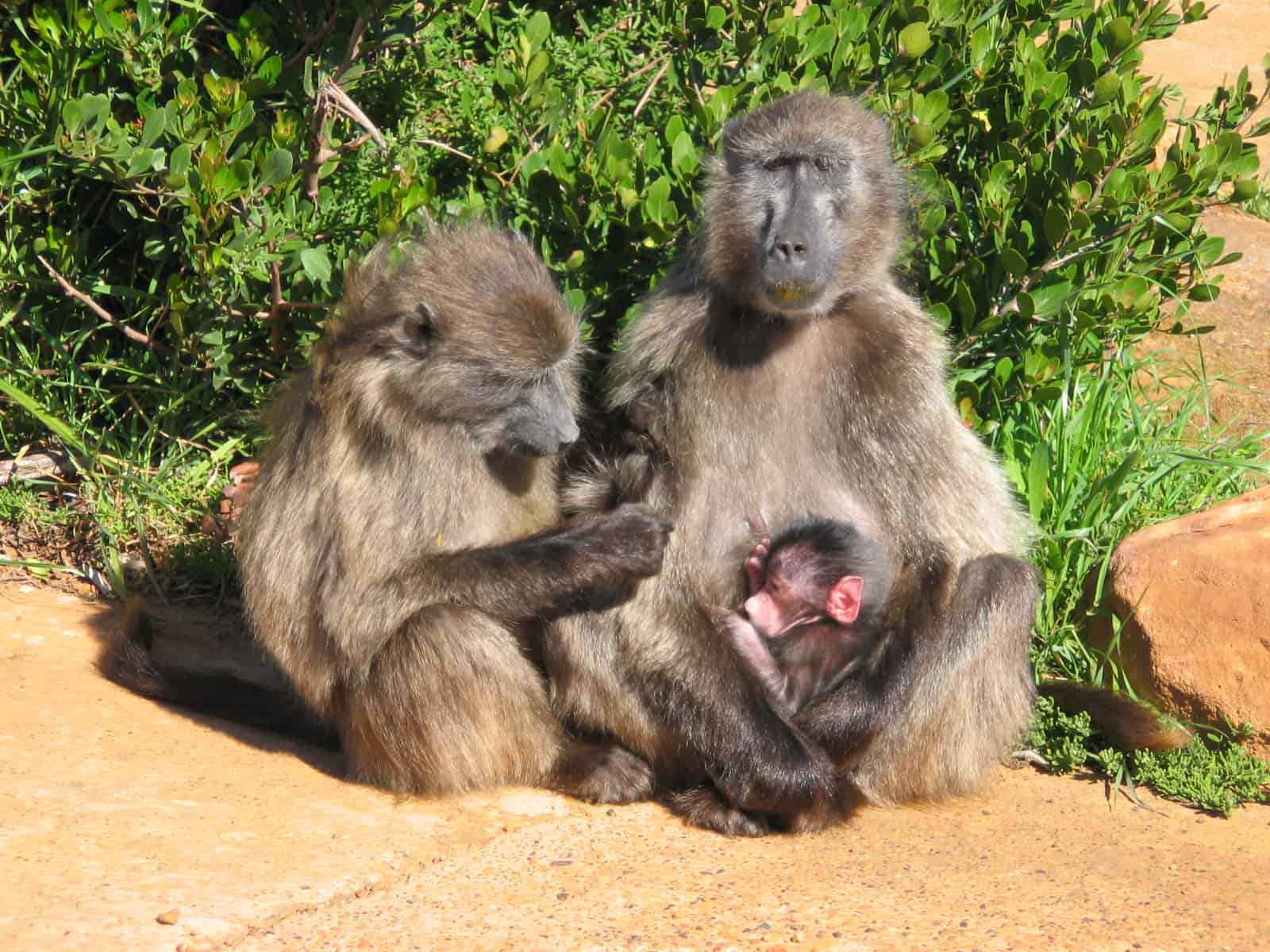Although monkeys are mischievous and cause trouble, they avoid conflict with other animals, specifically dogs. It is much more common for a dog to kill a monkey, but there have been cases of monkeys killing dogs.
This conduct may result from the dog startling the monkey or the monkey defending itself. Still, killing dogs and other animals can also be due to the monkey’s aggressive behavior.
Let’s learn about monkeys and other primates, including chimpanzees, killing dogs and the motivations behind this behavior.

The
chimpanzee
is one of the most aggressive and violent primate species that are about four times stronger than people of the same size, so killing dogs is easy for them.
©Afandi Teguh Afriyanto/Shutterstock.com
Why Do Monkeys Kill Dogs?
A monkey will likely only resort to violence if they feel a dog threatens them, their young, or another troop member.
This type of behavior happens because monkeys build relationships with the members of their troops. So, they will defend troop members from internal and external attacks.
But, adult male monkeys are known to target puppies, so people should keep their pets safe if they live in areas close to troops of monkeys.
Are Monkeys Aggressive?
In general, monkeys are not known to be aggressive creatures like the gorilla. Monkey attacks on humans are extremely rare in the wild. Most of the time, monkeys will often run away rather than attack when a human or animal comes within 100 feet of them. However, as monkeys lose their natural habitats around the world, they are slowly starting to live closer to human populations. This also means that they are living closer to pets as well.
Monkeys as pets can be unpredictable, aggressive, unmanageable, and even dangerous. Often times they are known for biting or scratching even their favorite caregiver. No amount of training will tame a wild animal or keep them from asserting their dominance since this is a common behavior found in the wild.
Although your average wild monkey won’t go out of their way to attack something, there have been cases of monkeys practicing what’s thought to be a series of “revenge killings.”
Langur Monkeys Allegedly Killed 250 Dogs Out of Revenge

Nepal grey langurs are similar to the langur monkeys killing dogs in India for revenge.
©iStock.com/Utopia_88
In 2021, locals captured two langur monkeys in Lavool Village, India, after they had killed over 250 dogs out of revenge. According to the locals, dogs had killed one of the monkey’s infants. Following the killing, locals saw the monkeys kidnapping and dragging dogs to the tops of buildings and trees before dropping them to their deaths.
Villagers also saw the monkeys kidnapping puppies. They would then leave the puppies on roofs or treetops, where they either fell to their deaths or died due to exposure or a lack of food and water. These two monkeys did not only target dogs. There were also reports that they started attacking children in the area.
A Nagpur Forest Department team eventually captured the two monkeys. They transported them to a different area, releasing them into the forest. Local officials do not believe that the monkeys acted out of revenge as there was no solid proof. Still, villagers believe the monkey massacre was an act of ongoing revenge.
Apes Also Attack Dogs and Humans
Besides monkeys attacking dogs, other primates engage in similar behavior. Although not monkeys, chimpanzees and baboons may share many features, but they are apes. However, researchers have come across reports of chimpanzees and gorillas attacking dogs and humans.
Chimps Attacking Dogs
Apes are relatives of monkeys and attack dogs, as well as humans in some cases. A study found that the human’s closest living relative, chimpanzees are naturally aggressive. Michael Wilson, an associate professor of anthropology at the University of Minnesota, led the study and said, “Violence is a natural part of life for chimpanzees.”
Chimpanzees are native to the tropical regions of Africa. They are known to lead coordinated attacks against other animals and chimpanzees. Chimpanzees are even known to be cannibalistic. However, chimpanzees that live close to human settlements or are captive may also attack domestic pets like dogs without provocation.
Chimps Attacking People
Besides attacking dogs, chimpanzees have also attacked humans and caused severe bodily damage, if not death. In 2005, two chimpanzees that escaped from their California enclosure attacked a couple living near the facility. The couple survived, but the husband lost one eye, his nose, testicles, most of his fingers, and flesh from his buttocks, and face after the attack.
In a separate incident in 2009, a woman’s pet chimpanzee attacked her. She suffered severe mid-facial soft tissue and bone injuries, ocular damage, scalp degloving, and mutilation of the hands. Both these attacks appear unpredictable, with the victims seemingly doing nothing to provoke them.
Baboons Killing Dogs in Human Settlements
Baboons in southern Africa are disruptive animals who will deliberately enter homes to look for food in homes. In Knysna, South Africa, residents often report incidents where baboons break into their homes looking for food.
While doing so, the baboons smash windows and valuable items and trash the house. In many cases, the family dog disrupts the baboons. The baboons defend themselves and attack the dog out of fear and retaliation.
Although some attacks are deadly, they do not always kill the dog. Jagger, a Boerboel from the Knysna region, needed extensive surgery after being attacked by baboons.

Monkeys that kill dogs include baboons, which are extremely strong and have fangs that can pierce skin and muscle tissue.
©Harald Süpfle, CC BY-SA 2.5, via Wikimedia Commons – License
Ways to Monkey-Proof Your Home
If you live near troops of monkeys, there are ways to monkey-proof your home and protect your dogs. The most vital thing is to keep your dog inside when you are not home. If the dog lives outside and must face a troop of monkeys, the interaction may be fatal.
Also, install mesh over your windows and burglar bars to prevent monkeys from entering your home when your windows are open. This measure will prevent monkeys from getting through windows or breaking them.
The main reason for monkeys entering homes is to look for food. To prevent your home from becoming an attraction, avoid leaving food or scraps in outside trash cans for long periods as this attracts monkeys. You should also consider installing latches or locks on trash cans outside the home.
Another prevention measure is to secure any pet entrances, like pet doors. For example, you can install pet doors that unlock when receiving an automatic signal from your pet’s collar.
If a monkey tries to get close, try to scare it off. You can use a large stick, swing a pan, or use a water hose to discourage proximity. Avoid coming into physical contact with monkeys as they will likely attack out of self-defence. Instead, make loud noises and gestures to scare them away.
Monkeys are intelligent and will learn that your home and surrounding area are not a safe space for them.
You may also want to install an electric fence. If you live in an area with large monkeys like baboons, installing an electric fence may be necessary. Although an electric fence is an effective way to keep monkeys out, it should be the last resort.
Up Next
- Monkeys vs. Apes: The 5 Main Differences
- 5 Incredible Videos of Monkeys Laughing (And Why They Do It)
- Monkey Animal Pictures
The photo featured at the top of this post is © iStock.com/JicKaro
Thank you for reading! Have some feedback for us? Contact the AZ Animals editorial team.






